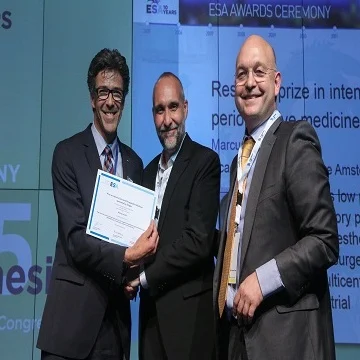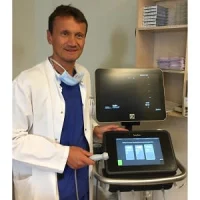Lübeck/Berlin – Professor Marcus Schultz from the Academic Medical
Center at the University of Amsterdam (AMC) is the recipient of this
year's “ESA Prize in Anaesthesia and Intensive Care Medicine”. The
European Society of Anaesthesia (ESA) is bestowing the award for his
paper “High versus low positive end-expiratory pressure during general
anaesthesia for open abdominal surgery”1 which comes with 10,000
euros in prize money. This has been donated by Dräger, a leading
international company in the fields of medical and safety technology.
Professor Wolfgang Buhre, chairman of the scientific committee at the ESA,
awarded the prize during the Euroanaesthesia 2015 together with Michael
Wilkening, head of the the customer area Operating Room in the Hospital
segment at Dräger.
The trial by Professor Schultz examined the uncertain role of positive endexpiratory
pressure (PEEP) in mechanical ventilation during general
anaesthesia for surgery. Schultz and his scientific team tested the hypothesis
that at-risk patients would suffer fewer postoperative pulmonary complications
if a strategy involving a high level of PEEP and recruitment maneuvers at a
low tidal volume was used during open abdominal surgery.
From February 2011 to January 2013, 447 patients were randomly allocated
to the higher PEEP group and 453 to the lower PEEP group for the trial2
.
Median levels of positive end-expiratory pressure were 12 cm H2O (IQR 12-
12) in the higher PEEP group. Postoperative pulmonary complications were
reported in 174 patients (40 percent) of the higher PEEP group. In the lower
PEEP group (median levels at 2 cm H2O [0-2]), the number of patients with
complications was negligibly smaller at 172 (which equals 39 percent).
However, compared with patients in the lower PEEP group, those in the higher
PEEP group developed intraoperative hypotension and required more
vasoactive drugs.
The study therefore disproved the original hypothesis. A strategy with a high
level of positive end-expiratory pressure and recruitment maneuvers during
open abdominal surgery does not protect against postoperative pulmonary
complications. As a result, an intraoperative protective ventilation strategy
should include a low tidal volume and low positive end-expiratory pressure
without recruitment maneuvers.
ESA Prize awarded for the ninth time
The ESA Prize in Anaesthesia and Intensive Care Medicine is awarded
annually to a research team in the fields of anesthesia or intensive care
medicine in order to foster team spirit and cooperation between clinical care
and industry in scientific research. The prize is awarded to scientific papers
published over the course of the previous year. In 2007, it was awarded for the
first time.
Source and image credit: Dräger. Technology for Life®
Latest Articles
Anaesthesia, ESA Prize, PEEP, vasoactive
The trial by Professor Schultz examined the uncertain role of positive endexpiratory pressure (PEEP) in mechanical ventilation during general anaesthesia for surgery










